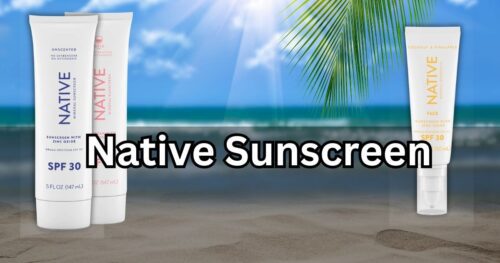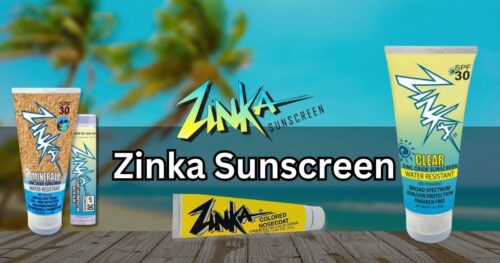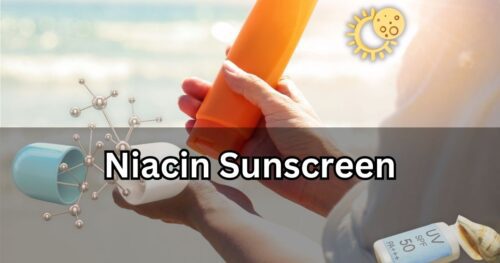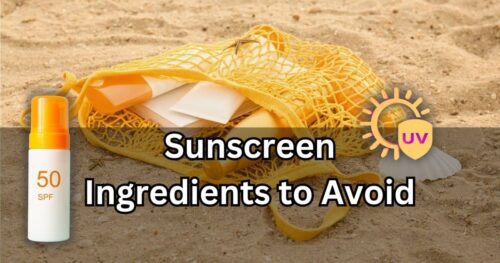Yes, your eyes can get sunburned like any other part of the skin exposed to the sun’s harmful UV rays. Eye sunburn is also known as Photokeratitis, which can be quite painful.
The skin of the eyelids is the thinnest skin of the human body. It can be easily damaged and sunburned by harmful UV rays of the sun. Make sure to apply sunscreen.
The cornea and conjunctiva of our eyes are transparent, so the eye sunburn is even worse compared to other skin.
Cornea: It is the layer of the eye covering the colored part (iris) of the eye; it has a role in vision. Sunburn can damage it, leading to temporary blindness and cloudy vision in severe cases.
Conjunctiva: It is the protective layer covering the white part of the eye. Its damage can cause itching, discomfort, burning sensation, and redness.
Table of Contents
Symptoms of Sunburned Eyes
Here are common symptoms of sunburned eyes:
- Eye irritation
- Sensation of foreign objects in the eye
- Headache
- Blurring of vision
- Watery eyes
- Burning sensation in the eye
- Eye redness
- Loss of vision (temporary blindness)
- Halos around eyes
- Swelling around the eyeball sometimes with blisters (Rare)
Eye sunburn usually self-heals and goes away within 48 hours.
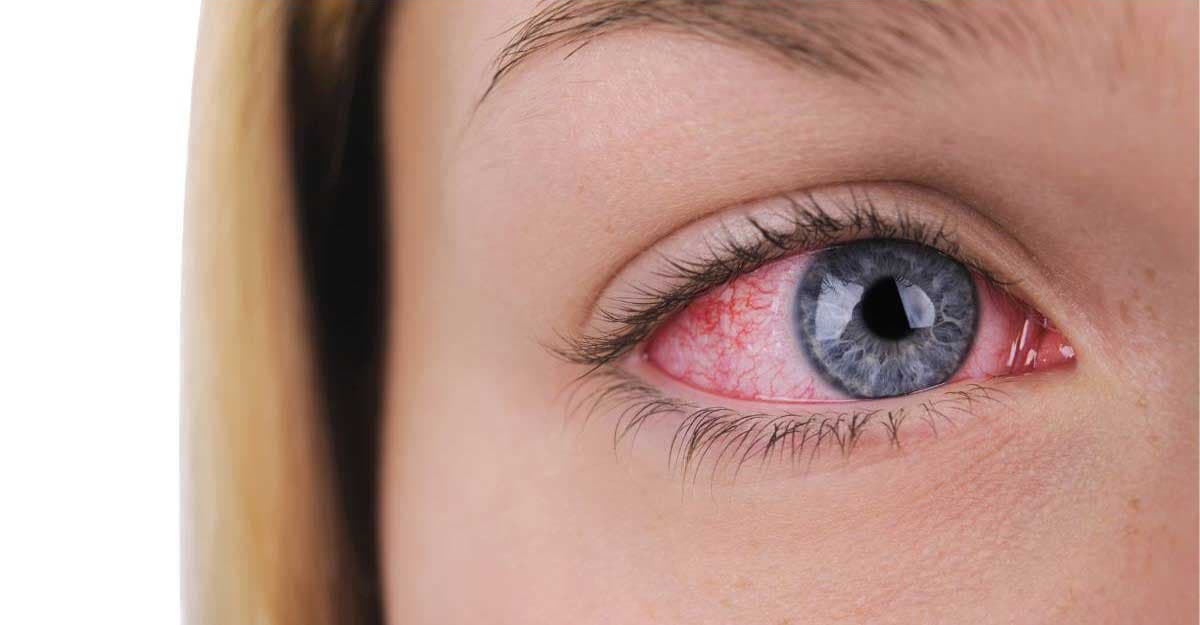
Signs To Seek Medical Attention
The eyes and the skin around the eyes are extremely sensitive. You should immediately consult a doctor when there is
- Swelling around eyes
- Blistering
- Any damage to the skin which causes skin cracks
- Signs of skin infection like pus discharge
- Severe pain in the eye
- Blurring of vision or Halos
- Fever
Potential Long-Term Consequences of Sunburned Eyes
Sunburn eye symptoms typically resolve within two days. But, if care is not taken in the future and sun exposure keeps damaging the eyes over time, more serious issues may arise, such as:
Cataracts: UV ray exposure damages the lens and causes cloudy vision leading to cataracts.
Macular Degeneration: It occurs when UV rays damage the retina. It could lead to impaired vision.
Pterygium: It is the formation of scar tissue on the eye. This tissue can grow over to the cornea and block vision.
Eye cancer: A research published by St John’s Institute of Dermatology concluded that
Solar UV rays cause DNA damage to the eyes and skin. Many long-term exposures can lead to various types of skin and eye cancers.
Minimizing sun exposure damage by sun avoidance and photoprotection is likely to mitigate the risk of skin cancer, especially in sun-sensitive vulnerable skin types.
How To Heal Sunburned Eyes
Sunburned eyes usually heal on their own in most cases and don’t require any specific treatment. However, some methods can reduce pain, itching, discomfort, and other symptoms. The following methods can be used to heal sunburned eyes.
- Hydrate eyes: Hydrating eyes with artificial tears can reduce itching and strain.
- Avoid any light: Avoid light and give complete rest to the eyes. It prevents any additional strain on the eyes. It also helps with light sensitivity due to sunburn.
- OTC Painkillers: Painkillers help in the general reduction of pain; you can use acetaminophen or ibuprofen.
- Hydrate yourself: Drink lots of water; sometimes, sunburned eyes are accompanied by general dehydration.
- Avoid Rubbing: One of the symptoms of sunburned eyes is a sensation of foreign particles in the eyes, which may tempt you to scratch them. Please don’t do it! It could do more harm than good. In this situation, use artificial tears.
- Take off contact lenses: Contact lenses could be a source of infection and discomfort on top of sunburned eyes.
- Keep Screen time to the minimum: The light from screens can strain already sunburned eyes. Staring at screens for too long can worsen or trigger headaches.
- Don’t use makeup: Using makeup on sunburned eyes is a bad idea. Not only can it cause delayed healing and discomfort, but also it can cause infection on already damaged skin.
- Cold compresses: Cold compresses help with pain relief. Take a washcloth and wet it with ice-cold water. Then apply it gently on closed eyes. Do this 3-4 times daily, depending upon the need.
In most cases, you can take care of sunburned eyes with home remedies. But remember to consult a doctor if your symptoms are severe and your eyesight is affected.
Related: How To Sleep With Sunburn
Eye Drops For Sunburned Eyes
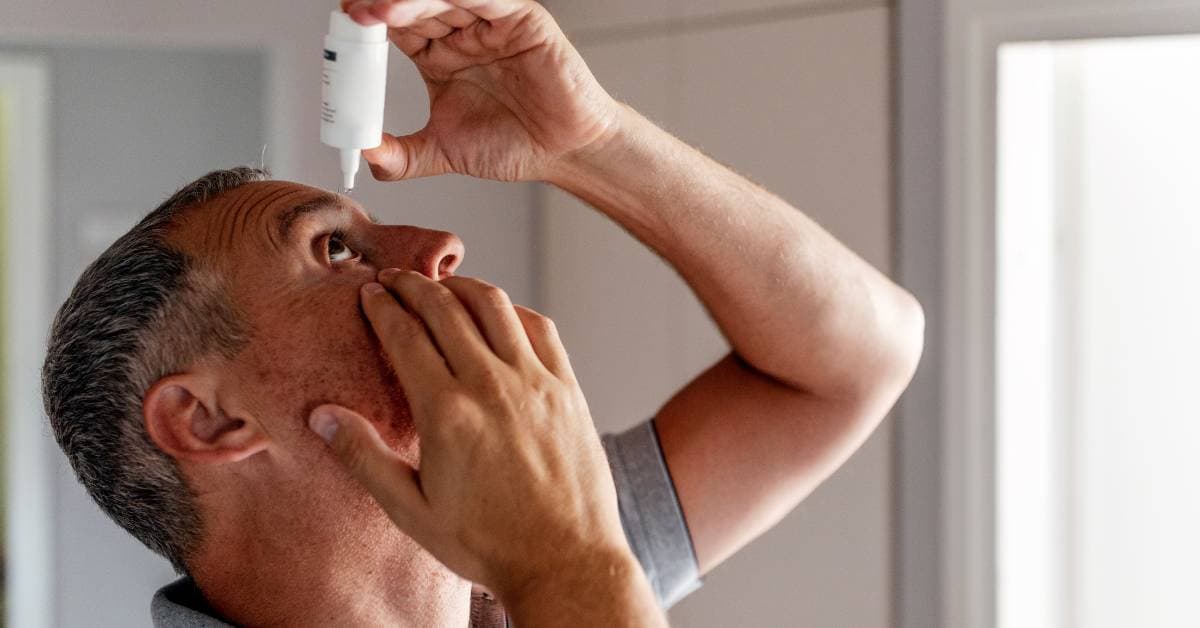
American Academy of Ophthalmology recommends following eye drops for Photokeratitis
- Artificial Tears
- Antibiotic eye drops (Recommended by an ophthalmologist if needed)
Daniel Twelker, Professor of Ophthalmology at Arizona College of Medicine Tucson, advised
“You need to put a drop of the artificial tear in your eyes at least every hour to keep things lubricated, which will give you a lot of relief.
The other thing you can do is put a cool compress over your eyes – a clean washcloth, clean water, rinse it out or wring it out, and put that over your eyes and close your eyes and rest your eyes.
An anti-inflammatory could also be helpful.”
Related: Black and Green Tea For Sunburn, Amazing Benefits
How to Prevent Eye Sunburn
The best way to avoid UV exposure is to completely block the sun rays from reaching your eyes. Wide-brimmed hats cover the eyes well, reducing the chances of sunrays entering the eyes. The following can be used to prevent eye sunburn:
- Glasses with UV protection
- Wide-brimmed hats
- Sunscreen and balm on the skin around the eyes
Some other sources which may cause eye burn are:
- Welding light
- Laser light
- Tanning lamp
- High-intensity light bulbs
Always wear proper eye protection when exposed to welding UV light, tanning lamp or any laser.
Some tanning beds are more dangerous to the eyes as they have many folds of additional UV rays compared to the sun. Always cover your eyes with UV protection glasses or goggles.
Jennifer Tsai OD tells us general measures everyone should take to prevent eye sunburn.
UV Protection Glasses
A survey conducted by the Vision Council regarding the use of UV protection sunglasses revealed:
Despite being aware of the harm of sun rays to the eyes, most Americans don’t wear sunglasses because of discomfort and lack of affordability.
Keke Palmer was asked in an interview by Wired, “Does Keke palmer wear glasses?”. She answered:
“I do, I wear glasses, and now I’ve been walking around lately wearing two glasses. I did sun gazing in Joshua Tree and sunburned my retina. So be careful with the sun, the UVs, and global warming; you’ve got to protect those eyes. Because now I’m seeing double and stuff. My astigmatism is going left. The doctor said he couldn’t even promise me it’ll heal.”
Consider These Things When You Select Sunglasses
Avoid Ordinary Sunglasses
Ordinary sunglasses, without UV protection, will not be helpful; it’ll be even worse.
Ordinary sunglasses give you a false sense of security against UVA and UVB rays, making you drop your guard and be at ease. Meanwhile, the malicious sun rays keep harming your skin and penetrate deep within the most sensitive areas of the eyes.
Use Wider-Framed Sunglasses
While choosing sunglasses, it must be considered that sunglasses with wider frames are more effective and useful. Small framed glasses always have a risk of passage of UV light from the sides of the edge into the eyes. Wide-framed glasses with a wide-brimmed hat provide an excellent protection factor for the eyes against sunburn.
Check UV Protection Rating
Dr. Daniel Twelker, Professor of Ophthalmology, advised
“The best way to buy sunglasses is to look at the UV protection rating. It should be about 97%, 98%, and 100% protection. You can get what’s called polarized sunglasses, which will selectively cut out reflections.”
Related: Medically Proven Healing For Sunburn With Tea Tree Oil
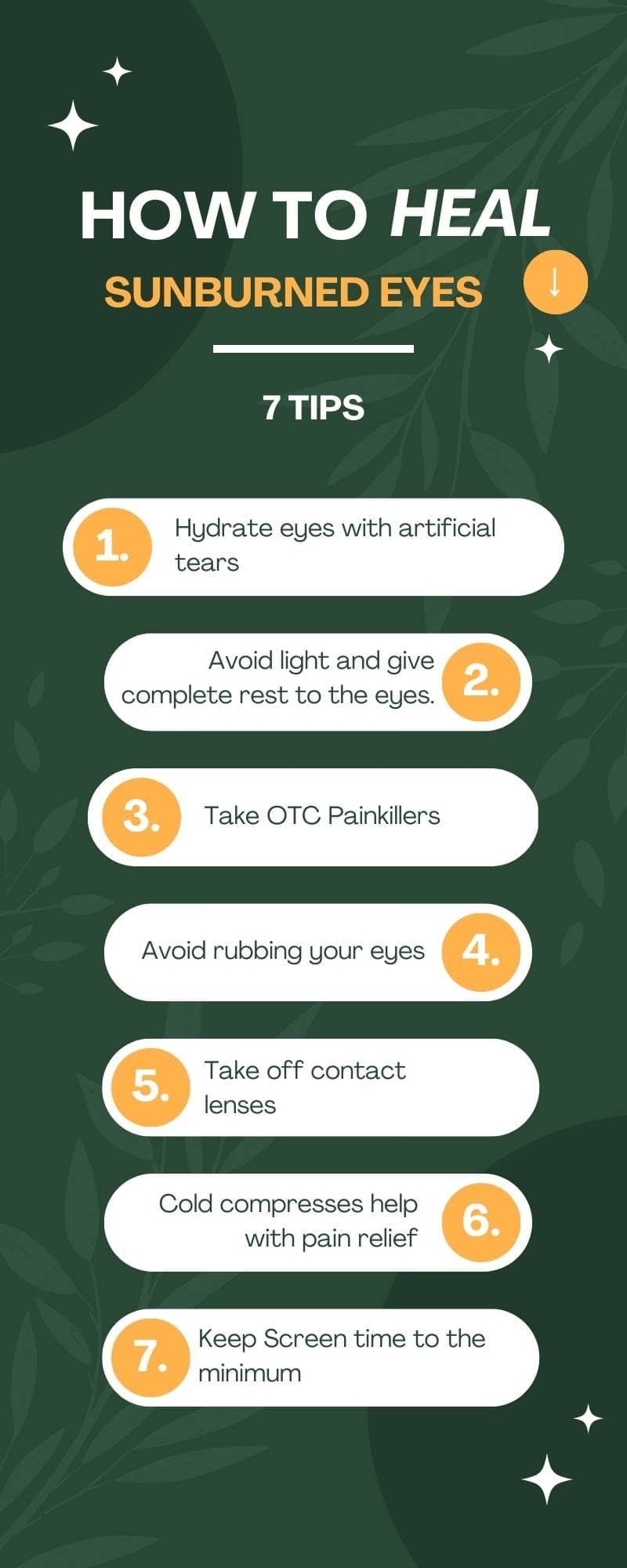
Lighter Skinned People have an Increased Risk of Sunburn Around the Eyes.
Lighter-skinned people are more prone to sunburn around the eyes than those with darker skin, as they have less melanin, which acts as a protective barrier from the sun.
The skin around the eyes is already thin and sensitive. If the factor of lighter skin is also considered, it can act as the final piece of the puzzle for eye sunburn.
How Eyes Can Get Badly Sunburned: Causes and Risks
In severe cases, the sunlight might damage the retina (Light sensitive membrane), reaching the back of the eye. Retina damage can cause severe and sometimes irreversible damage to the eye.
Snow Skiing and Snow Blindness
Did you know that skiing exposes your eyes to increased risk? Sunlight directly affects eyes and reflected light from snow also bombards eyes with additional rays.
It’s like focused sunbeams burning your eyes simultaneously. This type of eye damage is also known as snow blindness.
A research published in Wiley online library warned that UVB radiations of the sun could lead to snow blindness. Hence it’s crucial to cover your eyes while skiing. Good skiing goggles are a great investment compared to all the potential pain and damage caused by fatal UV rays.
Tips to Prevent Sunburned Eyes While Skiing
David Jackson, MD at Dean McGee Eye Institute, while giving an interview to KOCO 5 News, said:
“If you’re skiing without goggles, you can get sunburned eyes or Photokeratitis in as little as one hour, which is very painful.
Your eyes can even get dry and teary after only 15 minutes when the UV index is high.
Sunglasses that block both UVA and UVB rays are great, but also make sure to get glasses that wrap around. Otherwise, peripheral ultraviolet damage often occurs.”
Sunburned Eyes From Reflected Light
Most people think they’ll be okay if they don’t look directly at the sun. UV rays can also enter your eyes in other ways, such as by reflecting off of snow, water, and metal surfaces.
Almost every object has a reflective property, although not as much as snow, water, or metal. Still, reflective rays from nearly any object can make it into the eye. So it would be best if you were prepared for that.
CNN broadcaster Anderson Cooper was shooting a story on a beach when he experienced the same phenomenon; he said
“I wake up in the middle of the night, and it feels like my eyes are on fire, my eyeballs, and I think, oh well, maybe I have sand in my eyes or something. I doused my eyes with water. Anyway, it turns out I have sunburned my eyeballs, and I go blind, and I went blind for about 36 hours.”
Conclusion
Eyes are sensitive to the UV rays of the sun. Exposure can lead to sunburned eyes and other damage. Symptoms include eye irritation, sensation of foreign objects, headache, blurring of vision, watery eyes, and redness. Artificial tears, cold compression, painkillers, and rest can help with symptoms. Use UV protection sunglasses, wide-brimmed hats, and sunscreen when going out in the sun. Consult a doctor if symptoms worsen.
FAQ
Is sun damage to the eyes reversible?
In most cases, the damage caused by the sun heals within two days. However, prolonged damage and multiple exposures may cause irreversible conditions such as cancer, cataract, or pterygium.
Can wearing sunglasses damage your eyes?
No, Sunglasses do not cause damage to the eyes. Instead, it’s the exact opposite. UV protective sunglasses are essential for blocking harmful UV rays.
How long does eye sunburn last?
Sunburned eyes last up to 48 hours, but it heals within a day in many mild cases.
If the sunburn is severe, it may lead to long-term effects and require a doctor’s consultation.
Why does looking at the sun hurt your eyes?
Looking at the sun directs harmful UV rays into your eyes, which damages the cornea and conjunctiva and causes pain. It may lead to retina damage and temporary blindness. Hence, it’s not advisable to look directly at the sun.
Can sun damage or sunburn cause a change in the color of the eyes or Hair?
Extensive research by the British Journal of Ophthalmology showed sun damage or sunburn doesn’t cause a change in the color of eyes or Hair.
You don’t need to worry about the change in eye or hair color, but you should take extra care in the sun to avoid bigger problems.
What is Arc Eye?
Arc eye is a condition that arises when the eyes are exposed to high levels of UV radiation. It is a type of Photokeratitis commonly caused by welding or other bright light sources.
Pain, sensitivity to light, and impaired vision are common symptoms. Therapy consists of rest, lubricating eye drops, and pain medicines.


